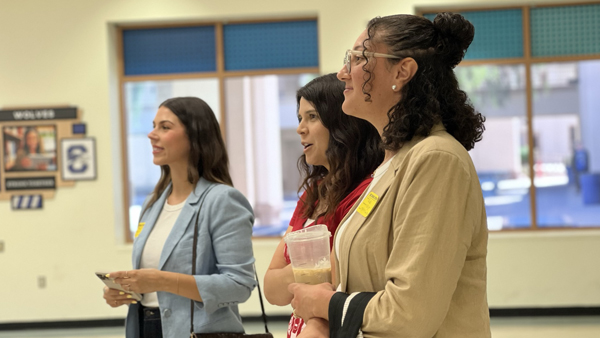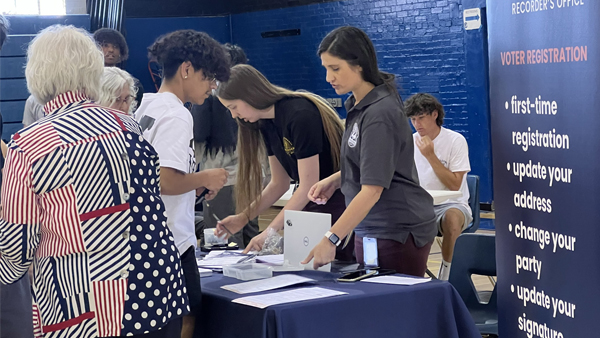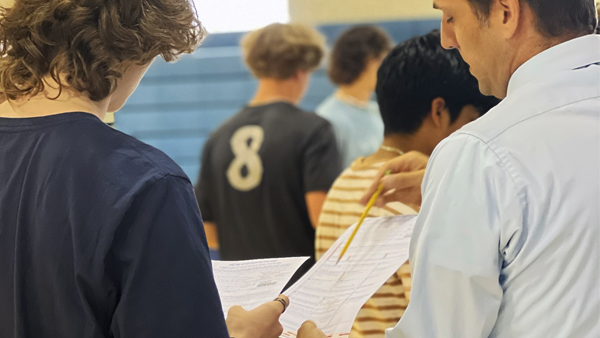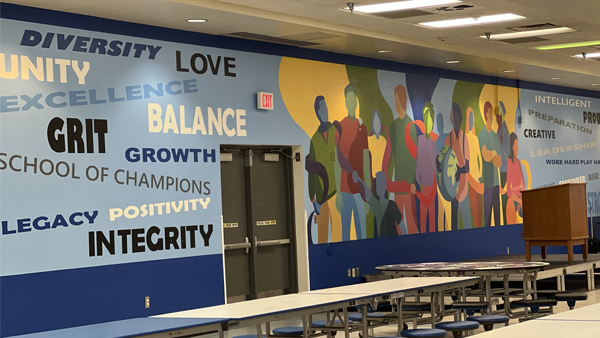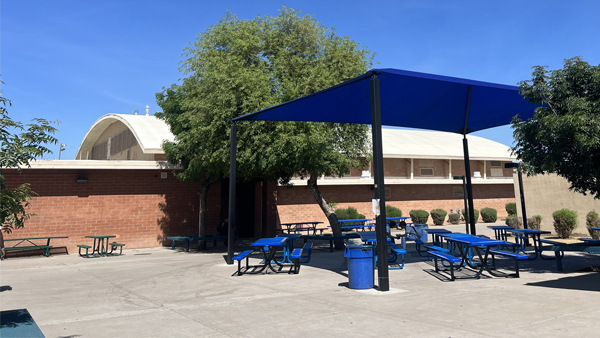School Participatory Budgeting Empowers Future Generation of Arizonans
On a Friday in late spring, a buzz was building on Chandler High School’s campus. Groups of students were moving quickly to the school’s gym to make their voices heard. Not by yelling to cheer on classmates during game day; Chandler High students were participating in Vote Day. A vital opportunity for students to decide how the school would spend almost $15,000 on a campus improvement project.
Vote Day is the result of months of idea sharing, planning, and preparation as part of School Participatory Budgeting (SPB), a process supported by Center for the Future of Arizona (CFA).
The initiative empowers students to gather with confidence and bring changes they care about to their campuses. It’s an innovative civic learning process designed to prepare young people to be active, informed, and engaged participants in civic life for the long term.
Chandler High began implementing SPB in 2018. Kelsey Brown is a history teacher at Chandler High and the driving force behind the school’s SPB process as the sponsor of the student steering committee – the group of students who lead the SPB process throughout the academic year. Brown helps students focus on pragmatic problems instead of hypotheticals.
“The first year, they were asking for Gatorade water fountains, which don’t actually exist,” says Brown. “This year, they were all real, actual things. Their awareness of what we can do has definitely developed.”
"...the outcome of the vote isn’t as important as how the process impacts students"
- Kelsey Brown
From Brown’s perspective, the outcome of the vote isn’t as important as the positive effect the process has on students.
“For me, the projects that get funded are more of a fringe benefit. It’s really all about getting them engaged,” according to Brown.
That engagement starts several months before Vote Day. While school administrators and teachers provide essential support, the process is designed to be all student-led – from idea collection through the vote. Early in the academic year, 11th-grade students form a steering committee that leads the SPB process for the school. The committee surveys the entire student body to determine potential campus improvements. Typically, seven to ten projects are proposed to the district, and Chandler Unified determines what is truly viable. The District allots $100,000 total for middle and high schools participating in SPB. Individual schools receive $10,000 to $15,000 each.
Philip Robertson, academic coach, and Chandler Unified’s SPB District Coordinator, says the students go through a process of learning why a proposal may or may not be doable. He’s impressed by the students’ dedication. For example, a project to install water bottle filling stations was repeatedly denied due to an electrical component.
“Students were persistent. Now it’s a clear ‘yes’ for water bottle fillers because the students stayed persistent and figured out, ‘Okay, you said no to this little component, but we can figure out how to solve this issue.’”
In addition to Chandler Unified, CFA has partnered with Mesa Public Schools, Phoenix Union High School District, Sunnyside Unified School District, Roosevelt School District, and Queen Creek Unified School District to implement SPB.
CFA plays a direct role in supporting districts and schools participating in SPB. Madison Rock, Project Manager for Civic Health at CFA, describes the relationship, “It’s really everything from the very beginning to the very end: designing the process, the timeline, figuring out how to allocate the budget, who will participate, all the way until the implementation of the projects at the end of the year and evaluating what worked, what didn’t work, and what recommendations the participants have for the future.”
To date, SPB has engaged 70,000 students across 62 campuses and encouraged nearly $1 million in public dollars to be invested in 100+ student-developed improvement projects.
"The effort to engage students in making their voices heard is responsive to the aspirations Arizonans have for addressing challenges in Arizona's broader civic health."
The effort to engage students in making their voices heard is responsive to the aspirations Arizonans have for addressing challenges in Arizona's broader civic health. According to CFA’s Gallup Arizona Survey, only 28% of Arizonans say Arizona has strong leaders. Yet over 70% want to work together to improve our communities, solve problems, and build a democracy that works for all.
Through efforts like SPB, CFA is helping the community create the civic engagement and leadership Arizonans want by equipping, engaging, and empowering the rising generation to be active and informed participants in civic life. KaRa Lyn Thompson, Senior Program Coordinator for Civic Health at CFA, is working towards this ideal by helping students understand the value of their perspectives.
"When a student says, 'Who me? Leading on campus?’ we say 'Yes, you are the leader we’re looking for, and you absolutely are capable of doing this on your campus. And we’re excited to see where it will take you after this year.'"
- KaRa Lyn Thompson
“I think the first one that came to mind was a student saying, ‘Who me? Leading on campus?’” Thompson relates. “Yes, you are the leader we’re looking for, and you absolutely are capable of doing this on your campus. And we’re excited to see where it will take you after this year.”
Thompson says trust is a significant element at the core of CFA’s work with SPB.
“I think first is just trusting CFA to be a partner in this, and I think that happens because we’re very consistently in the community sharing about the model. Then students start to learn trust with adults on campus, not just those who are shepherding them through this whole process but office admin, procurement specialists, and maintenance folks, they start to really learn that these are real people…some of the questions and frustrations they have on campus, adults have some as well. And they’re starting to build this relationship with one another,” Thompson says.
Chandler High’s Vote Day reflects that the students are taking responsibility seriously. The clamor as they headed to their tabletop voting booths was anything but childish, a heartening reality to teacher and SPB sponsor Kelsey Brown.
“They get very into the project they want, and I think this is a gateway for them to understand and approach our life and our system in the same way,” Brown says.
The winning 2023 project at Chandler High was about providing flexible seating options. The school ordered bean bag chairs to be distributed across campus classrooms.
Deputy Registrars from the Maricopa County Recorder’s Office are also on hand during Vote Day to help interested and of-age students register to vote on the next Election Day—whether that’s municipal, state, or federal. SPB has registered over 6,500 students through Vote Day partnerships with local elections.
The impact of School Participatory Budgeting under CFA’s leadership will only grow. CFA’s Madison Rock says implementing an SPB institute is a goal for the next school year and part of expanding access to the initiative. “It’s a tangible way to teach young people about their role in their community, to empower them through real dollars to make decisions that improve their school communities, and to build that sense of trust, that cohesion,” Rock says.
And this proven approach will help community leaders of tomorrow get adept early on at making decisions that will affect them, their families, and friends far into the future.

